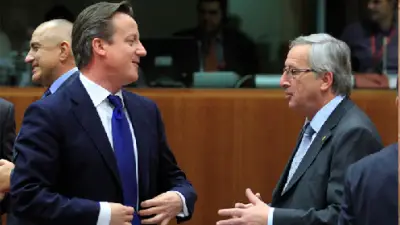Whilst most UK newspapers are convinced that this is a huge fail for Cameron, let’s consider what could be the positive outcomes of his campaign against Juncker…
1. Cameron showed his European counterparts that he’s serious about reform – or at least about changing Britain’s relationship with the EU
Since Friday’s vote, a number of EU leaders have made encouraging statements about working with Cameron, not least Juncker himself who has assured David Cameron he is “fully committed” to reaching a “fair deal for Britain” within the EU. Angela Merkel also said she was “ready to address British concerns”, whilst Swedish Prime Minister Fredrik Reinfeldt said he knew closer union was not “for everyone”. Cameron may have lost the vote, but it looks like he made his point.
Despite complaints of the UK being a ‘difficult member’ nobody in the EU wants the UK to leave – especially not Merkel and I’m assuming Juncker doesn’t want a Brexit to be his legacy. They will have to work with Cameron. Whilst the EU doesn’t want to set a precedent for ‘cherry picking’ areas of integration, it is now slowly starting to accept that a multi-speed Europe may be inevitable – a step forward for Cameron’s EU reform campaign.
2. Cameron showed the British public that he’s ready to stand up to the EU and fight for British interests
Cameron’s hardline stance against Juncker is proving a success with voters. Despite the dramatic headlines about the UK nearing an EU exit, Cameron’s ratings have not fallen following his ‘defeat’. In general the public have supported Cameron’s strong stance on reforming the EU and his opposition to Juncker – in last week’s YouGov poll, only 14 % answered that Cameron was wrong to oppose Juncker whilst the latest Populus poll for the FT revealed that 43 % feel that the Prime Minister is “right in any case” to try and block Juncker.
Cameron repeatedly stated that he will “keep fighting for what he believes in” – conveying the impression of himself as a strong and principled leader so his ‘defeat’ is nevertheless viewed as a sign of strength rather than weakness. Frustrating as this kind of rhetoric may be for EU leaders, Cameron recognises that if he wants to keep the UK in the EU, he needs to focus on the British public and his messaging at home, rather than securing ‘good relations’ with EU leaders. Ultimately, any possible secession referendum will be a test of how Cameron has managed to negotiate reforms with the EU, rather than what specific reforms have taken place.
3. Cameron has successfully labelled Juncker as a federalist, anti-British ‘Brussels old hand’ set on resisting reforms, which could help in selling Cameron’s ‘re-negotiations’ at home
To say that Juncker got some bad press in the UK would be a big understatement. He has spent his entire career championing further EU integration so he was never going to be a popular candidate. However, his portrayal by UK media has made him UK public enemy number 1 in Europe. Cameron may well be able to use this in the future to pressure Juncker into certain reforms. If Juncker doesn’t cooperate, Cameron can use this to excuse any further shortcomings in his EU reform campaign.
Few EU leaders came to Juncker’s defence as he wasn’t really anyone’s first choice – he simply managed to manoeuvre himself into a position where he become the de-facto candidate following the EU elections. He’s a ‘Brussels insider’ because he knows how to work the system but also understands that reaching consensus at the EU level is only possible through give and take bargaining between member states. Therefore it is more likely that his reputation for backroom deals will actually help Cameron in his future EU negotiations.




